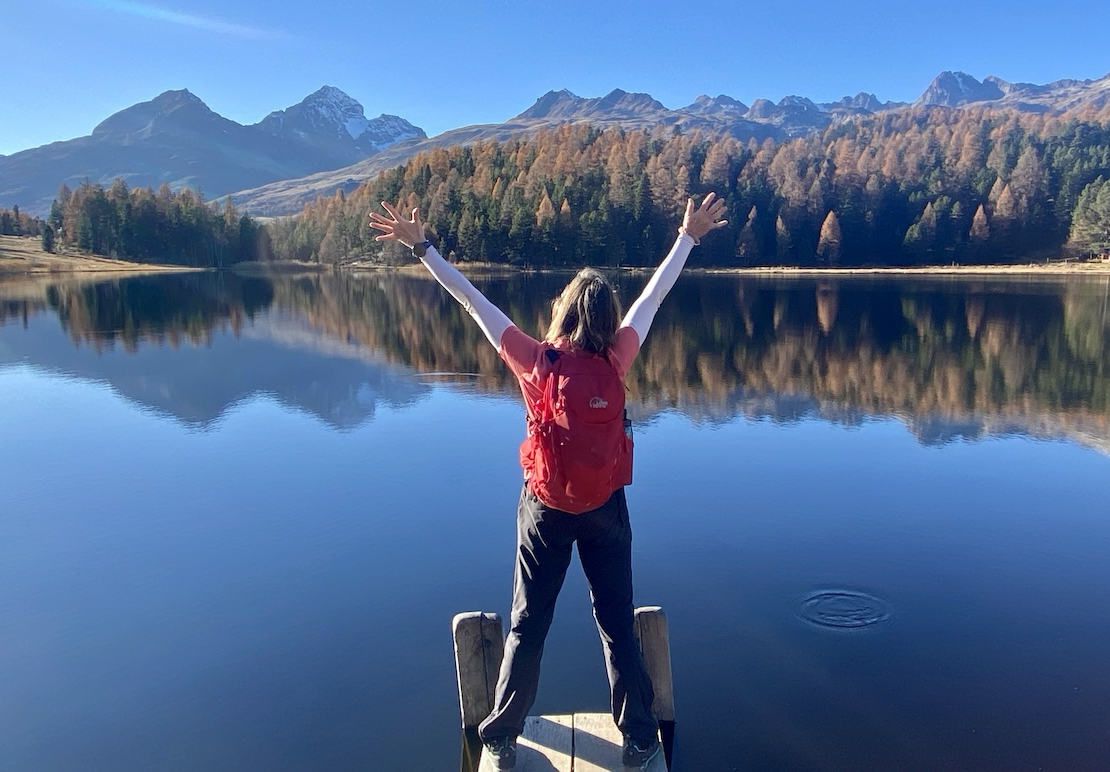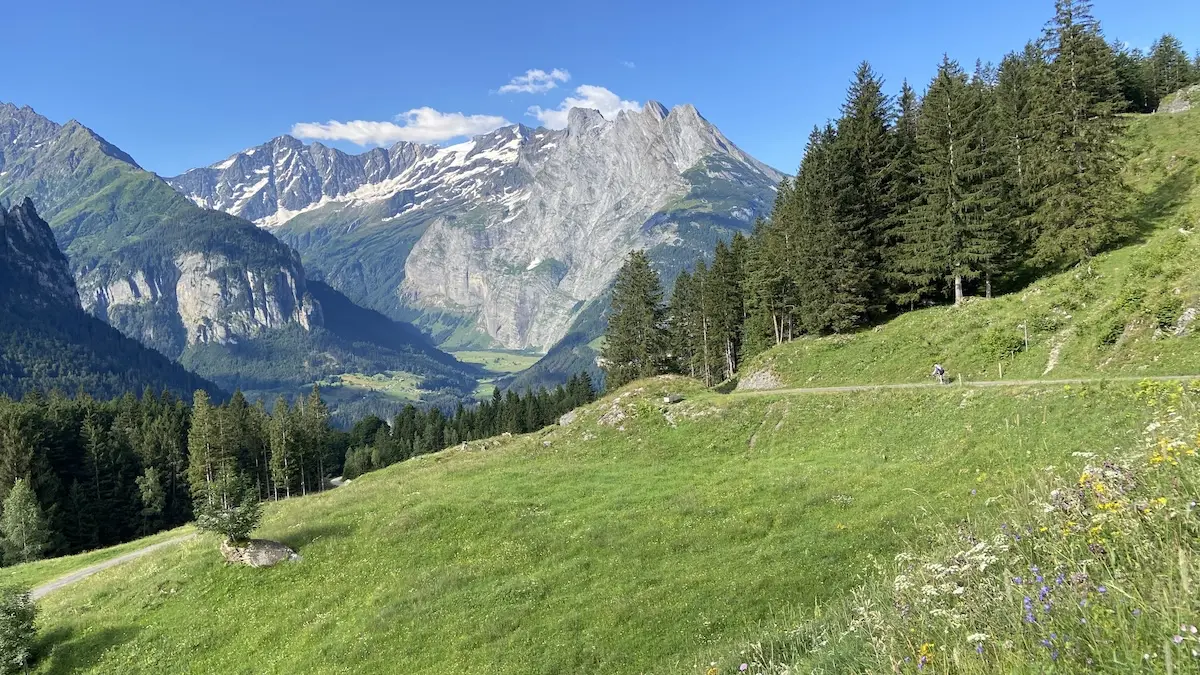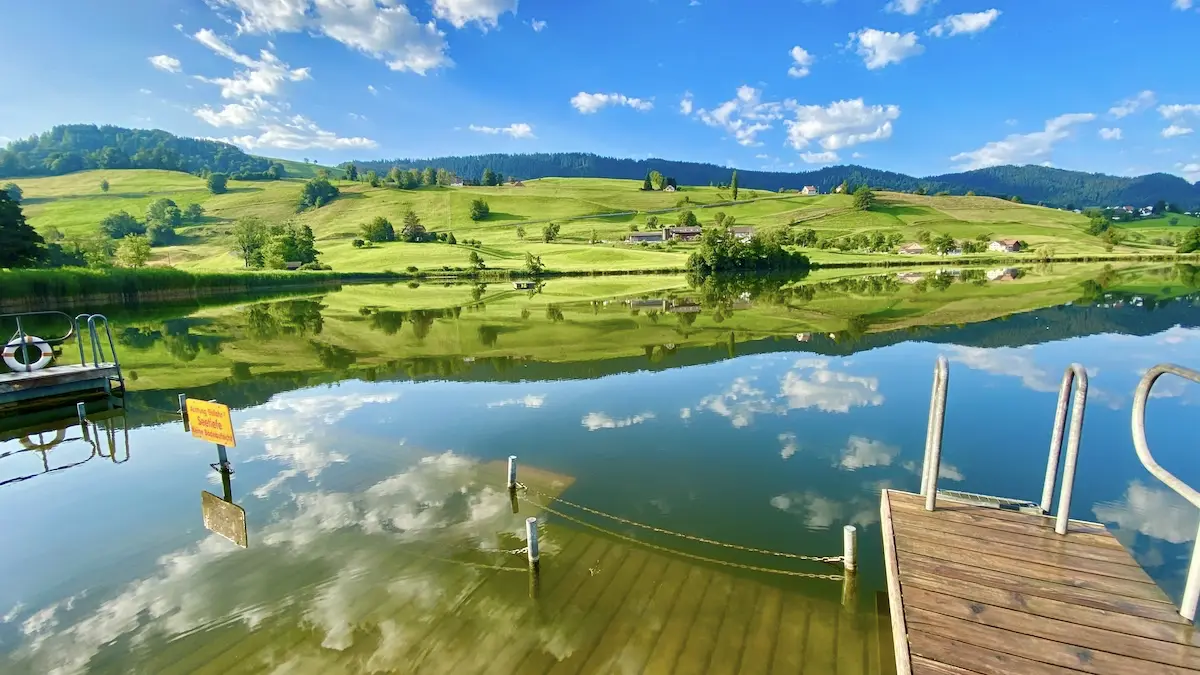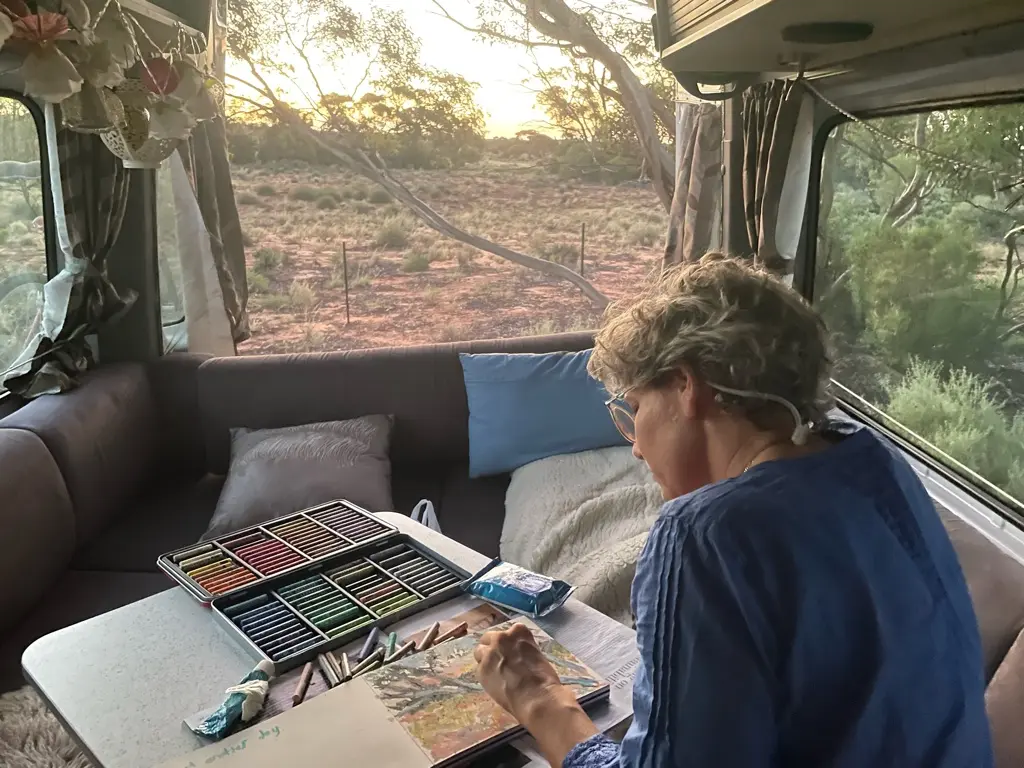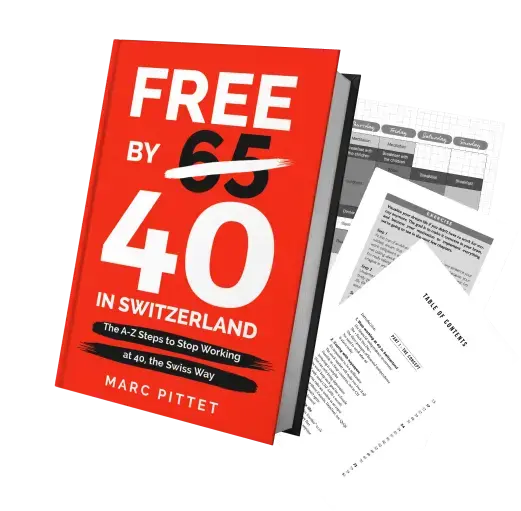Concrete stories of Swiss folks who succeeded to early retire was one of the thing I missed when I started my financial independence journey back in 2013.
I’m glad to have persisted with the blog over the past 11 years, as I start to get more and more of them from readers.
The keyboard is yours Becky.
Hey Marc! I feel like I am still floating as if in a dream… but let me introduce myself before I share what happened.
(By the way, the header photo above was taken on the 1st day I was FIRE, at Lake Staz near Saint-Moritz!)
I’m Becky, and here is my background
I live in Switzerland on the shores of Lake Zurich. I grew up in the US, and spent about half my adult life so far there, then came to Switzerland 17 years ago (in 2008).
The original plan was to be in Switzerland for only 3 years! But the natural beauty and endless opportunities for outdoor adventures made it clear to me that this is a great place to stay.
Luckily, I was able to quickly find a job here at a global reinsurance company in Zurich to make it possible to stay. Even though it was right in the middle of a financial crisis (in 2009), they needed more people at the time with my background (risk management). My university degree is in mathematical statistics, and I trained in the US and worked as an actuary, which involves applying quantitative analysis and long-term projections to address financial questions – or as I like to say:
Using mathematical logic to solve finance-related puzzles.
Working as an actuary is quite a good career in many ways including financially, providing a stable income, plus the training was all financed by my employers, so I never had to be weighed down by financial loans for my additional studies.
It’s also a very interesting career, which is a nice combination of analysis and communication, as a big part of my job included providing training and other sessions to explain complicated technical items in an understandable way.
After 30 years of working as an actuary in the financial industry, I decided to leave the corporate world. It wasn’t an easy decision since I had a good job at a good company with great colleagues. But I decided I wanted more time to do the things I love with the people I choose to do them with, and to move into a phase of doing different kinds of projects.
I’m 53 years old (“Fifty-three and financially free” has a nice ring to it doesn’t it!) and live together with my partner who is Swiss.
He is 65 and recently retired.
We enjoy doing a multitude of activities together in the great outdoors, including hiking, biking, running, kayaking, snow sports, and climbing/via ferrata. We are active in a local choir where I play piano as accompanist and we both sing, and we are also active in the local community volunteer activities. He has six grandchildren, and as they get older we enjoy taking them on various adventures as well.
My father lost his job… and taught me an invaluable lesson!
When I was in high school, my father lost his job and we thought we might have to move to a different city, which I was quite sad about since I was very active in the band and other music groups in my school.
Luckily, he got a job with a company that trained him to work with clients about investing, and he taught me then what he learned – including the general motto to “Pay yourself first”, i.e. set aside money for investing before spending it, and investing in diversified, low-cost index funds with long-term perspective.
I am very thankful that he taught me these important fundamentals when I was at such a young age!
When I started working, I immediately applied this saving and investing approach, and I also maximised all employer-provided benefits. In the U.S. there are typically no pension funds like in Switzerland, just mainly some tax-deferred savings plans where the employer would sometimes match a portion, and which we needed to invest our savings ourselves each time we changed jobs.
To invest it, I just followed the structure I learned from my father; that is, buy low-cost index funds with a high-risk tolerance since it’s for the long-term, and then leave it alone. I didn’t even look at my brokerage account balance – just kept adding to it whenever I could.
My money goal was always to be financially independent and not to have to rely on my parents or anyone else.
I just knew I wanted to have options.
I had a scholarship for my university studies, and I worked as a math tutor to earn spending money. I started working in a corporate job as soon as I could after university so that I could start saving and investing, with the main goal being that I could make my own decisions on how to spend my money even if my parents disagreed with my decisions. This was very empowering at the young age of 22!
It was basically engrained in my mind that I need to save for myself since the government will not be providing for me.
And if for some reason I lost my job like what happened to my father, I wanted to have options and not to have to make changes I wouldn’t want to make just for a new job.
I thought I might want to take a break from corporate work at some point, perhaps a sabbatical, or possibly to work part-time, or maybe even to change into a different kind of work that would interest me in a different way but might earn less. I didn’t really know what exactly my long-term goal was, I just knew I wanted to have options.
Travels and struggles to invest as a US citizen
Even though my goal was to maximise savings and investments, I also knew it’s important to enjoy life in the current moment, especially since we never know what might happen in the future.
Maybe we’re not healthy enough by the time we retire to even enjoy the money we’ve saved.
It doesn’t make sense to be so frugal that we save everything for some future time at the expense of any enjoyment now. A continual challenge is finding the right balance for saving vs living now.
Luckily, I never was a shopper or had expensive hobbies like collecting cars or something like that — I have a lot of hobbies which don’t cost a lot of money, including hiking, biking, or playing music.
There are so many amazing things one can do, especially here in Switzerland in the great outdoors, that don’t require a lot of money. (As MP says/writes so well, “The best things in life are free”!)
I’ve also done a lot of traveling all around the world and experienced a lot of things such as climbing Mt Kilimanjaro or hiking in Patagonia and Alaska… Even though it has reduced the amount of money I could save, I don’t regret it at all as the experiences are priceless.
[…] the long-term growth made up for a lot of the challenges.
For me, as an American living and working overseas, another struggle has been sorting through the financial requirements and limitations. When I wanted to invest, I had to send the money from what I earned from my job here in Switzerland to the U.S. to be allowed to invest in index funds for many years. Luckily there is a large choice of good low-cost investments there (such as Vanguard) so the long-term growth made up for a lot of the challenges.
Once I was able to invest in Switzerland 1, I had a lot to learn about the different investment options including brokerage firms, how to find the best available ETFs, and the different tax optimising strategies available here. Even though it has taken quite some time and energy, I really enjoy learning about these different topics. If I had learned about the MP site earlier, it could have possibly helped me go into FIRE even sooner!
And then the decision to actually become FIRE
The big trigger that led to me finally doing it – to become FIRE (or on fire as I like to say 😊) – was when my partner retired in March this year.
He’s 12 years older than me, so I knew it would happen at some point, but I didn’t expect the feeling it would create would have such a strong impact on me.
Before he retired, we were both working and had a similar daily rhythm. After his retirement, that all changed, when suddenly his time was free, and he could choose how to spend it. Of course this made me quite jealous! He would be planning a hike with friends on a nice sunny weekday, when the weather was perfect, while I had to go into the office for a day full of meetings. I realised I really wanted to have more freedom to determine how to spend my time as well.
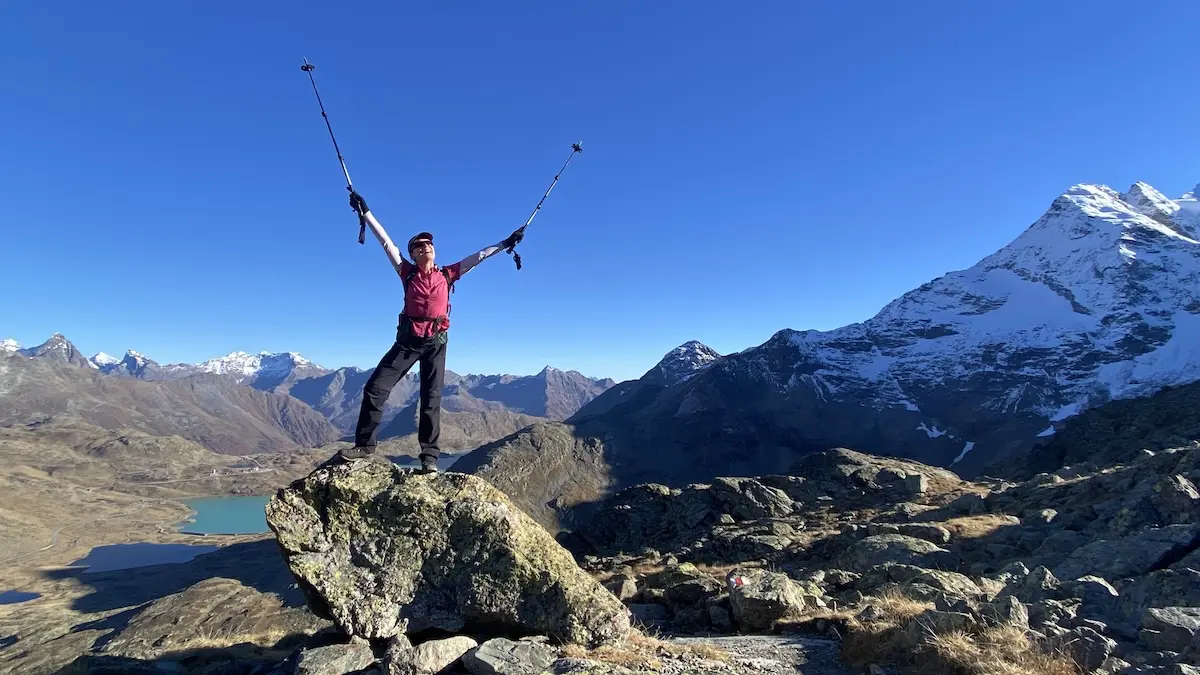
What a freedom feeling! (Day 2 of FIRE — Hiking Bernina Tour trail above Lake Diavolezza in Engadin)
Also ever since the COVID years — a time when many of us were contemplating the meaning of life and work — I’d been wanting to try some different kinds of work that I felt were important to me. As is often the case, these alternative paths would not provide such a financial stability as I had enjoyed from the corporate work, but nonetheless I felt the inner push to take the leap and give it a try.
These feelings motivated me to fine-tune my analysis of my personal finances to better clarify how much I have and how much I need. I had heard of the 4% rule many times, but I had never really focused on it for myself until now – I had just focused on “save as much as possible” while still living a good life.
I updated and enhanced my spreadsheets and ran a few different scenarios.
I updated my budget and clarified my cashflow needs, including buffers for unknowns and future changes (just as I would do in my actuarial work 😊), and compared it to my total asset balance. And lo and behold, it confirmed I had reached (or exceeded) the 4% rule. What an exciting feeling!
It confirmed I had reached (or exceeded) the 4% rule!
This confirmed my decision to leave my corporate job, so that I could have more freedom and flexibility to do the things I want, as well as to pursue some different types of work that are important to me and make me feel I can make a difference. Even if the new work and activities do not earn nearly as much as my previous job, it is a good feeling to know my cashflow needs are covered by my investments.
Fine tuning my finances before taking the plunge
I have applied the Do It Yourself approach to investing, i.e. investing it myself via an online brokerage company into low-cost index funds or ETFs.
I did it this way since it saves money by avoiding high banker fees, plus I like doing these kinds of things myself. Honestly, at first, when I was in my early twenties, it was quite scary to make my first investments myself online, but each time it got easier. I have always made sure to maximise tax-efficient options when feasible such as the pillar 3a.

Setup your investments, then forget about them and go cross-country skiing! (photo taken near Einsiedeln)
I have set up a “bucket system” 2 for myself so that I have cash bucket available for immediate and short-term needs, a medium-term investment bucket for mid-term needs, and most of it in the long-term investments.
As a rule, I do not look at my investment portfolio regularly. But I must admit after my first month of FIRE, I checked and totaled up my assets and compared them to the month before since I was curious 😊
The increase was very positive, so that was a good start! Of course, I know it will go up and down in the future and I am prepared for that.
I’m now 53, and financially free!
Life feels incredible!
I still wake up sometimes thinking it must be a dream. I love getting to decide how I spend my time each day, and in general I feel much calmer. I have so many activities which I like to do, so I still feel very busy – but in a positive way.
The topics are those close to my heart – e.g. music, volunteering, helping in the community, as well as simply spending time in nature or riding my bike over the beautiful Swiss hillsides.
I still need to use my daily planner and other online tools, even more than when I was working, to organise and plan all my activities and coordinate schedules.
If I feel I’m too busy, it’s my own fault since it means I planned too much! I still have to say “No” to some things and make priorities since time is not limitless. And sometimes, we just decide spontaneously to go hiking in the mountains or in Ticino where it’s more often sunny, so it’s nice to keep time open for that.
I was already quite active with many volunteer activities, and now I’m thankful to have more time to spend on them. One of my favorite volunteer activities includes regularly bringing groceries to and spending time with a 90-year-old lady who lives alone.
I’m happy to have more time for music and planning things for our choir.
For a local club/association, I lead workouts as well as hikes in the mountains.
To me, it’s always been important to get active in the local community, especially as a foreigner coming into Switzerland who didn’t know anyone at the beginning. It takes an investment of time and energy to get integrated here, but it’s been worth it to me.
I love going into our village and seeing people I know or that know me – it makes it feel like home.
One of my next projects is cleaning out closets/de-cluttering our home so that eventually we may be able to rent it out when we go for longer periods of travelling. We are planning some longer trips such as to Asia and the Americas, but also to spend some time in places in Europe including e.g. Italy to learn and practice Italian. From the cleaning up project, it’s a nice feeling to donate things that we no longer need and make space for this next chapter of life.
A few of the activities I do earn some small amounts of money, including organising and leading hikes in the mountains for clients. I also recently did a training course with my partner for coaching, and we’ve had a few sessions with clients already.
I have also started providing some financial coaching to women friends, to share the knowledge and experience I’ve built up in this important and fun topic over the years. I am grateful to have learned the important fundamentals from my father when I was young, and I am happy to help others to be able to experience how good it feels to have your money work for you over time. It is certainly worth it.
As I highlight to them, it’s never too late to start investing – the important thing is to simply do it!
Advice for those who want to become FIRE
If retiring (very) early is your goal, I’d recommend “transitioning” to FIRE if possible. That’s what I did, switching from a 100% to a 60% role in my company two years before I left.
It was a great way to “test” my freedom and use this time to optimize my portfolio, as well as to work on developing my “side activities” to move forward after the departure.
Conclusion
From a money perspective, my total amount of money is above (but not excessively) 25 times my annual expenses, so just above the 4% rule.
I feel fine with this for a few reasons including:
- I’m earning some extra money from my side-gigs which are now officially my self-employment income
- For everyone, I anyway think it’s important to keep doing things that earn a bit of money for a sense of contribution to society. Best is when it’s not required for living (as enough comes from the investments), but feels like extra pocket money
- AHV and Social Security (US) are not included in this net worth computation
- Apartment equity not included in my calculation neither, plus we’re planning to rent out our apartment when we travel for long periods
- Expenses are so far lower than I previously projected, since I enjoy being a minimalist, more and more as time goes by!
I find it’s actually easier to spend less money than I was spending previously, because I’m doing things that are free (in the great outdoors) and make me feel calm and happy, which results in less “impulse” spending or buying things that I might have previously as a reward since I was working hard.
Now, more than four months after starting my FIRE experience, I can confidently say that I do not regret at all the decision to go for it. I sleep extremely better than I did beforehand! And even though my total accounts balance has gone up and down since end of October due to the market changes during that time, overall it is higher than when I started FIRE even after expenses, so it is a good start!
Notes from MP about Becky’s story
The important of financial education for kids
As I read the story of Becky’s early life, I couldn’t help but think to myself: “This confirms to me that we’re doing the right thing by teaching our children the basics of personal finances and investment with Mrs. MP.”
Even though it’s up to them to decide whether or not to continue on the path they’ve been taught, without this education they’d be less well equipped for their adult lives.
There are two rules I’m looking forward to watching when they grow up:
- Any money received is divided in two: 50% goes into savings, and they do what they like with the other 50%
- All their savings are invested in the VT ETF. We set them up with an Interactive Brokers account each. And they invest themselves every quarter (well, with me next to them, because they click mega fast and I wouldn’t want them to click “Sell” by mistake haha!)
The power of the 4% rule
Reading Becky’s story reminded me of the day I discovered the 4% rule on Mr. Money Mustache’s website.
Thank you Internet though…
It was spring 2013.
And then, EUREKA!
I had finally found the method that would make me rich and financially independent in the long term. It was mathematical. It was logical. The opposite of all those Influencers-Insta-Youtube-Tiktok-quick-money-crypto-yo! I knew it would take years, between 10 and 16 in my case. But I knew I could stay the course with my persistence.
I’m looking forward to moving forward with our FI Planner tool to bring even more detail than the vague 4% rule to any Swiss who wishes to reach early retirement well before the official age of 65. If you’d like to join the waiting list, let me know by replying to any of my newsletters.
Freedom to deepen your why
While chatting with Becky by email in preparation for this article, she wrote me an important sentence:
Now that I have more free time, I might build up these “side jobs” [that I already had when being an employee] to earn more, and/or possibly other work where I feel I can add value and help people, but in general I am grateful that I don’t feel the pressure to HAVE to earn more money from them or any activity. I think actually that’s when things can take off even more successfully, i.e. when one focuses on the “Why” and not on the money earned.
I so agree with the last part of her sentence.
This is one of the reasons pushing me to “really” be FI before quitting my job as an employee. Because if there’s one thing I wouldn’t want, it’s to have to think about how to make money with the blog first, before considering the WHY behind it.
And you, what did you take away as inspiration or lesson from Becky’s story?
US citizenship: beforehand I was a US citizen, so I was not able to invest in passive investments like ETFs outside of the US without harsh tax consequences (and some brokerages outside the US just won’t allow ETF investing for US persons). Ironically I could invest in crypto here without any problem!
Then I got Swiss citizenship and gave up the US one so that financially things are much less complicated. So I have moved my non-retirement funds from US to Switzerland and invest in ETFs (and have some cash) here. ↩︎Buckets: I’ve tried to at least earn something on the cash amounts, so I opened a savings account with ZKB and one with Swissquote Invest Easy, maximizing the amount to earn the most interest (I don’t usually like Swissquote’s fees, but as this savings account is free, I decided to take advantage of it).
My non-cash buckets are all ETFs (in Interactive Brokers and DEGIRO) and Index Funds (in my US retirement fund/brokerage). In addition I have a (slowly) increasing equity in the apartment that I live in and bought 15 years ago but am not counting that in my total net worth when I calculate the 4% rule.
Previously I had a Pension account with my employer, and since I left I have those funds in a vested account (with Finpension, invested in index funds).
My mid-term bucket consists of some Bond Index Funds (in the US) and Gold ETFs here.
Long-term bucket is all equity ETFs and index funds, mostly Vanguard, which I started investing in already 30 years ago in the US when I started earning money from my first (real) job. So your recommendation of the VT ETF is right in line with what I’ve done all these years 👍
As for the overview, I have 85% in Equity ETFs/Index Funds, 5% in Fixed Income or Gold ETF, and 10% cash. I’m still in process of investing more of my cash, since I just recently transferred it from my US investments to reduce my currency risk. ↩︎
